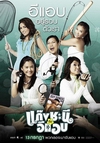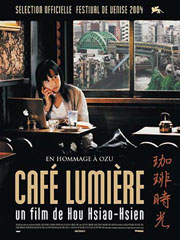skip to main |
skip to sidebar
One of my students just lent me a Thai film called Metrosexual. Its name in Thai can be roughly translated as The Gang of Gibbons and a Closeted Gay Man. Gibbons in Thai slang mean 'women' for gay people; it's a term of contempt as Thai gays believe that women love to cry out 'phua' most of the time, similar to those gibbons in the jungle. 'Phua' happens to mean 'husband' in Thai and it's not a polite term.
Anyway, let's talk about the film. My first impression is that these five women are loud and the world would be a better place without them. Erm ... I'm just joking. I just felt we're now at last able to tackle the issue of sexuality in a frank, funny way. But the film is still predominantly melodramatic -- they tend to overplay emotion and downplay the complexity of gender construction. The messages are very strong and easy to grasp -- friends last longer than lovers; women sometimes marry 'gay' men by accident; and people fall in love happily on Loy Kratong Day. (The last one being just plain awkward and excessive, it simply should be cut from the film.)
and the world would be a better place without them. Erm ... I'm just joking. I just felt we're now at last able to tackle the issue of sexuality in a frank, funny way. But the film is still predominantly melodramatic -- they tend to overplay emotion and downplay the complexity of gender construction. The messages are very strong and easy to grasp -- friends last longer than lovers; women sometimes marry 'gay' men by accident; and people fall in love happily on Loy Kratong Day. (The last one being just plain awkward and excessive, it simply should be cut from the film.)
However, it does make me wonder. Is being gay something one is born with, or is it constructed by society? Why cannot Kong get married to Pang at the end and reshape his sexuality? Or is it possible that there's this essence of being gay in there waiting to be discovered? And once one 'discovers' (rather than 'invents') this 'true' self, one needs to express it accordingly out of sincerity. I don't think there's an accurate answer to this, but it has long been pestering me. Even though I'd like to be persuaded by the constructivist view of sexuality, that sexuality is something created and categorised by society, somehow I feel a bit ill at ease. Maybe one's gender is shaped by society and this process is too effective and successful, as one feels like gender is something that one imposes upon oneself by choice. Maybe it all starts with an arrangement of DNAs and society further imposes some sort of pigeonholing and stereotyping, creating pattern that imprisons rather than liberates humans.
Anyway, constructivist or not, I believe the film somehow plays upon an all too facile view of sexuality -- that it is something that waits to be discovered, that Kong's gayness is like Pat's gayness or Pee Bee's gayness. The film also suggests that there're also signals that can tell whether one is gay or not. I don't believe this and I think the level of 'gayness' in all 'gay' people is different, to the extent that labelling someone as gay becomes some sort of violence, of putting someone in Jameson's 'prisonhouse of language'. Maybe Kong is what society brands 'gay' but what if he truly loves Pang and wants to settle down together. If so, what Pang's friends do (i.e. asking Kong's male ex-lover to rekindle his homosexual desire) is really terrible. In a way, I somehow wish that Pang and Kong decide to get married in the end, despite the protest of their friends. It's not the question of fooling oneself, but rather it's a question of willing to 'perform' one's gender and stick to it.
I also got a friend who is married to a rather 'gender-dubious' guy. They've been married for years but they are still very much in love. Well, at first our group had a big discussion but at the end we came to a conclusion that it's not the point. The point is whether he really 'loves' her and whether he's willing to share the rest of his life with her. Maybe there're more to life than just labelling and branding ...
 I know I should have had updated this sooner during the school holiday. But hey I got life you know. On my birthday this year Mat took me (of course it's originally my idea) to the Siam Ocean World to see weird fish and a fake polar bear. It's such a pleasant experience to leave books once in a while and do something else. Well, books might be the world but the world does not only comprise books. Bookworms beware! Saying that, I'm hooked on Garcia Marquez's Erendira story at the moment. Such a contradictory man I am.
I know I should have had updated this sooner during the school holiday. But hey I got life you know. On my birthday this year Mat took me (of course it's originally my idea) to the Siam Ocean World to see weird fish and a fake polar bear. It's such a pleasant experience to leave books once in a while and do something else. Well, books might be the world but the world does not only comprise books. Bookworms beware! Saying that, I'm hooked on Garcia Marquez's Erendira story at the moment. Such a contradictory man I am.
Right, today I'm going to talk about the Japanese film Cafe Lumiere, which I saw long time ago but the feeling still somewhat lingers. It's nice to watch a 'silent' film once in a while, especially if you happen to live in one of the maddest cities in the world, littered with noise everywhere. Tops supermarkets for instance install this terrible advert thing -- if someone walks past this machine, it'll be activated to switch on and emit noise selling all sort of products from whitening face masks to cockroach baits. On top of that, they even play Tops radio in the background (sometimes so loud that I couldn't hear myself think!). I reckon people at Tops don't want customers to make a good judgement on what to buy and what not, but to be lured by their price gimmicks and display tactics.
Anyway, let's talk about the film. When I say it's a 'silent' film, I don't mean that the actors don't talk or become some sort of mute people. They do talk but they choose not to (maybe they've been living in Bangkok before moving back to Japan). It's 'almost a love story' between Yoko and Hajime, 'almost a love story' because you only 'feel' that the two are in love but there's no physical evidence of whatever kind in the film that tells you straightaway that they're so in love. They don't kiss; they don't hug, so don't even bother imagining that they'll have sex on the train like some Japanese porns. They just talk and sometimes they remain quiet -- just like that, side by side, in a second-hand bookshop run by Hajime, who happens to be handsome -- but somehow you can feel that there's kind of warmth and understanding emanating from their co-presence.
There's also another kind of quiet -- that between Yoko and her parents, especially her reticent Dad. Yoko is pregnant with someone else and her Dad does nothing but remain silent throughout. You can just tell that there's some sort of reproachful tone in his silence (pardon my use of paradox here).
The film ends abruptly, without letting people know that the two will live happily ever after. When I watched it, I was quite surprised at such a sudden end and thought that there's something wrong with the DVD. But then I bought it from a proper shop in Central World, not from a Silom stall, so it should be all right. It's just my mindset that's the problem. So I started to readjust my frame, realising that maybe the end is meant to be like that -- quick, abrupt, but powerful. Powerful in the sense that maybe life is like that: no one will know how people's lives will end and it can be quite precocious to presume. Maybe when two lives converge, it's like two trains passing each other. Just like that. A fond memory. Something that doesn't last but somehow lingers. No wonder why Hajime likes to record 'the sound of the trains': to take this metaphorically, perhaps Hajime can be compared to a film producer who tries to capture the rhythm of contemporary urban lifestyle in the changing Tokyo landscape. Oh such a metafictional subtext. Traditional narrative forms may no longer be appropriate -- no fairy-tale ending, no magical stardust turning an ugly pauper into a handsome prince. But it's good that it still keeps one traditional element intact -- love. Even though I didn't recall hearing the word uttered in the film, I got the feeling that the film wants us to realise that it's not easy living in a big city like Tokyo, but if there's someone there with you life will at least be easier.
Gosh, it's the first time in this weblog that I don't express any anger or annoyance at the end. How rare!
 and the world would be a better place without them. Erm ... I'm just joking. I just felt we're now at last able to tackle the issue of sexuality in a frank, funny way. But the film is still predominantly melodramatic -- they tend to overplay emotion and downplay the complexity of gender construction. The messages are very strong and easy to grasp -- friends last longer than lovers; women sometimes marry 'gay' men by accident; and people fall in love happily on Loy Kratong Day. (The last one being just plain awkward and excessive, it simply should be cut from the film.)
and the world would be a better place without them. Erm ... I'm just joking. I just felt we're now at last able to tackle the issue of sexuality in a frank, funny way. But the film is still predominantly melodramatic -- they tend to overplay emotion and downplay the complexity of gender construction. The messages are very strong and easy to grasp -- friends last longer than lovers; women sometimes marry 'gay' men by accident; and people fall in love happily on Loy Kratong Day. (The last one being just plain awkward and excessive, it simply should be cut from the film.)
